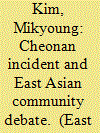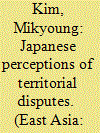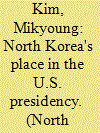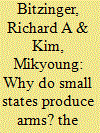| Srl | Item |
| 1 |
ID:
108382


|
|
|
|
|
| Publication |
2011.
|
| Summary/Abstract |
The East Asian community debates project the region as one integral unit. Rapidly shifting landscapes explain the tension between the old order and emerging hierarchy where North Korea plays a crucial role. This paper analyzes North Korea's place in the East Asian community debates by examining the regional governments' reactions to the Cheonan incident. The responses and circumstances of South Korea, Japan and North Korea to the sunken ship incident demonstrate three dynamics. First, domestic political needs of the regional government supersede normative Community rhetoric. Second, manageability of the North Korean regime will determine the next regional hegemon. And third, the community debates need to include North Korea for viability.
|
|
|
|
|
|
|
|
|
|
|
|
|
|
|
|
| 2 |
ID:
095754


|
|
|
| 3 |
ID:
145142


|
|
|
|
|
| Summary/Abstract |
This article examines the causal associations between domestic Japan’s socio-psychological indices and people’s perceptions toward territorial disputes with China and South Korea. The triangulation analyses do not support most of the hypotheses except the explanatory variables of age, level of educational attainment, and Japan’s future projection: The higher the age group, the stronger the territorial sovereignty conviction; the higher the level of education, the weaker the support for the Japanese government’s hawkish policy; and the more pessimistic the future confidence of Japan, the bigger the threat perception of China. The causality could be established only when the probability level was relaxed from 0.05 to 0.10. This research finds a weak overall causal association between domestic state of affairs and territorial perceptions. The public opinion on territorial claims remains more or less the same largely independent of domestic socio-economic conditions. This observation leads to a call to revise the conventional conflict cycle theory (i.e., status quo > provocation > rise of tension > conflict relaxation) in order to reflect more of simultaneous and interactive nature of inter-state conflict (i.e., action [tension/status quo/reconciliation] > reaction [tension/status quo/reconciliation]). The intra-state affairs have become more vulnerable to unexpected and hard-to-control contingencies which defy the procedural progression of conflict management. This implies that the elites can no longer monopolize the decision on foreign affairs.
|
|
|
|
|
|
|
|
|
|
|
|
|
|
|
|
| 4 |
ID:
092929


|
|
|
|
|
| Publication |
2009.
|
| Summary/Abstract |
Foreign policy behavior is a function of combined elements such as strategic calculations, institutionalized mechanisms, interactive constructed identity, and transaction/opportunity costs. The top leaders' connectivity serves as an intervening variable in the process. The personal connection, of course, cannot show the whole picture of behind-the-curtain dynamics, and yet it still is a piece of the puzzle in explaining "why it happened the way it happened." This article, an inductive analysis of narratives, explains why the current nuclear impasse emerged at the end of the Clinton administration and how the George W. Bush administration chose to dismiss the Kim Jong Il regime as a legitimate counterpart by focusing on cultural elements of the top leaders' ethos and worldviews.
|
|
|
|
|
|
|
|
|
|
|
|
|
|
|
|
| 5 |
ID:
065038


|
|
|